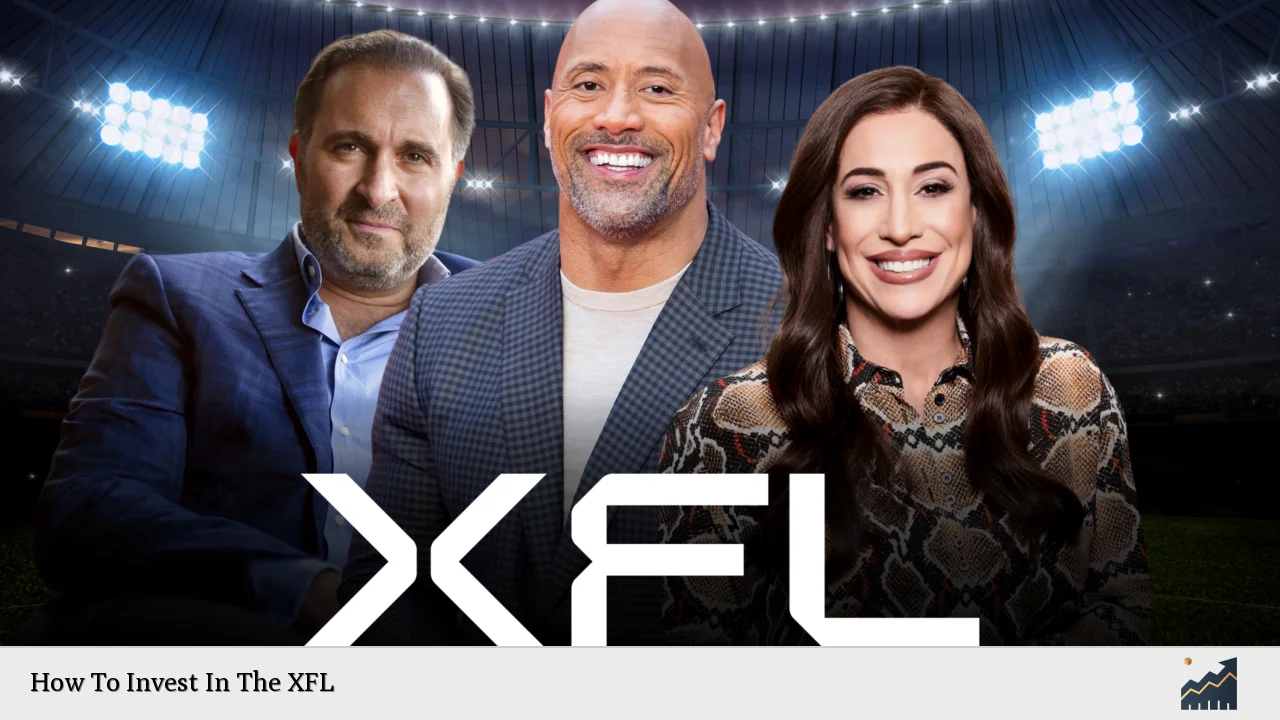Investing in sports leagues, particularly emerging ones like the XFL (Xtreme Football League), presents unique opportunities and challenges. The XFL, relaunched in 2023 after previous iterations, aims to carve out a niche in the competitive landscape of American football. With its recent merger into the United Football League (UFL), understanding how to invest in the XFL requires a comprehensive analysis of market trends, investment strategies, and regulatory considerations.
| Key Concept | Description/Impact |
|---|---|
| Ownership Structure | The XFL is privately owned, limiting direct stock investments but allowing for equity stakes through private funding rounds. |
| Investment Opportunities | Investors can participate through equity funding, partnerships with existing owners, or by investing in affiliated entities. |
| Market Potential | The XFL targets a growing audience for spring football, capitalizing on gaps in the sports calendar and fan engagement. |
| Financial Health | The league reported significant losses but has secured capital commitments for future seasons, indicating investor confidence. |
| Regulatory Environment | As a private entity, the XFL operates under different regulations than publicly traded companies, affecting investment transparency. |
| Future Outlook | The merger with the USFL aims to consolidate resources and talent, potentially enhancing profitability and market presence. |
Market Analysis and Trends
The XFL’s market positioning is influenced by several factors:
- Audience Engagement: The league aims to attract viewers during the NFL off-season. With a focus on innovative gameplay and fan experiences, it seeks to build a loyal following.
- Broadcast Partnerships: The XFL has secured broadcasting agreements with major networks like ESPN and ABC. Such partnerships are crucial for visibility and revenue generation through advertising.
- Financial Performance: In its latest season, the XFL incurred approximately $60 million in losses while generating about $80 million in revenue. Despite these losses, projections indicate potential profitability by 2027 as the league expands its reach and improves operational efficiencies.
- Merger with USFL: The recent merger into the UFL is expected to streamline operations and enhance financial stability by pooling resources and reducing competition between the two leagues.
Implementation Strategies
Investing in the XFL can be approached through various strategies:
- Equity Investments: Interested investors can participate in funding rounds. The XFL is currently seeking investors to own up to 45% of the league through equity funding initiatives led by firms like PJT Partners.
- Partnerships: Existing owners, including Dwayne Johnson and Dany Garcia, are open to strategic partnerships that align with their vision for growth. Investors may consider joining ownership groups or forming alliances with established stakeholders.
- Indirect Investments: While direct stock purchases are not possible due to the league’s private status, investors can explore opportunities in publicly traded companies that have affiliations with sports franchises or invest in sports-focused ETFs that include exposure to similar markets.
Risk Considerations
Investing in the XFL entails several risks:
- Financial Viability: The league’s history includes significant financial losses. Investors must assess whether future revenues will surpass operational costs.
- Market Competition: The XFL competes not only with other football leagues but also with established sports like the NFL. Its ability to differentiate itself will be crucial for long-term success.
- Regulatory Risks: As a private entity, transparency regarding financial health is limited. Potential investors should conduct thorough due diligence before committing capital.
- Fan Engagement: Sustaining viewer interest beyond initial seasons is critical. If fan engagement wanes, revenue from ticket sales and broadcasting rights could decline.
Regulatory Aspects
Understanding the regulatory environment is essential for potential investors:
- Private Company Regulations: The XFL operates as a private entity, meaning it is not subject to the same disclosure requirements as publicly traded companies. This can limit access to financial data for potential investors.
- Investment Structures: Equity investments may involve complex agreements outlining investor rights and profit-sharing arrangements. Legal advice is recommended to navigate these structures effectively.
- Compliance with Securities Laws: Any fundraising efforts must comply with applicable securities laws. Investors should ensure that they are informed about their rights and obligations under these laws.
Future Outlook
The outlook for investing in the XFL appears cautiously optimistic:
- Growth Potential: With an increasing interest in alternative football leagues and a solid broadcasting strategy, there is potential for growth in viewership and revenue streams.
- Long-Term Vision: Dwayne Johnson has emphasized a long-term approach to building the league’s brand and financial health. This vision includes fostering partnerships with other football organizations and exploring new markets.
- Consolidation Benefits: The merger with the USFL could provide operational efficiencies and a broader talent pool, which may enhance competitive viability against established leagues like the NFL.
Frequently Asked Questions About How To Invest In The XFL
- Can I buy stock in the XFL?
No, as a privately owned league, shares are not available on public stock markets. - What types of investments are available?
Investors can participate through equity funding rounds or partnerships with existing owners. - What are the risks of investing in the XFL?
Risks include financial viability concerns, market competition from established leagues, and regulatory uncertainties. - How does the merger with USFL affect investments?
The merger may enhance financial stability by pooling resources and reducing competition between leagues. - What is the expected timeline for profitability?
The league aims to be cash-flow positive by 2027 based on current projections. - Are there indirect ways to invest?
Yes, investors can consider ETFs or stocks of companies affiliated with sports franchises. - What should I consider before investing?
Conduct thorough due diligence on financial health, market conditions, and partnership opportunities. - Is professional advice recommended?
Yes, consulting with financial advisors or investment professionals is advisable before making investment decisions.
Investing in emerging sports leagues like the XFL offers unique opportunities but requires careful consideration of market dynamics, financial health, and strategic implementation. By understanding these factors and remaining informed about industry trends, investors can make educated decisions about their involvement in this exciting sector of professional sports.

